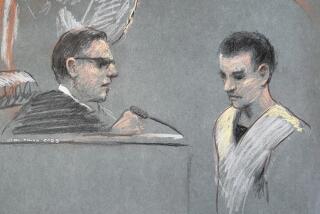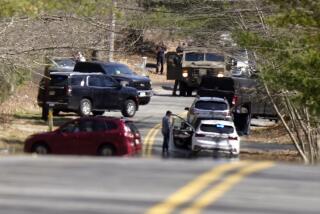Spy Case Held âSerious Lossâ by Weinberger
WASHINGTON â The alleged espionage activities of a family spy ring have caused âa serious lossâ to U.S. national security, Defense Secretary Caspar W. Weinberger said Thursday as the FBIâs investigation of the fast-breaking case spread to California.
Weinberger declined to be specific about what harm had been done, saying: âWe donât want to add to the seriousness of the loss by discussing in detail what has actually been taken.â
But the release of warrants that the FBI used in searching the home, office and other properties of John A. Walker Jr., the reputed ringleader, indicated that the groupâs spying extended beyond naval secrets.
Manual Found in House
The search of Walkerâs Norfolk, Va., house turned up a tactical satellite communications system manual and a confidential 1974 North Atlantic Treaty Organization document, according to the FBI warrants unsealed Thursday.
Government sources, in disclosing that the investigation had extended to âbusiness associatesâ of Walker in California, noted that Walkerâs 20-year Navy career included service in San Diego from 1969 to 1971, and in Vallejo in 1963. These years in the state âmight have given him the rootsâ for his contacts there after his 1976 retirement from the Navy, one source said.
Weinberger told a news conference that he had ordered a thorough review of military procedures to try to reduce future espionage attempts. And a Senate source familiar with Weinbergerâs thinking said that the defense secretary plans to improve the screening of defense contractor employees, among others.
âI know Weinberger believes that too many people are getting âsecretâ and âtop secretâ clearances without sufficient background checks,â said the source, who asked not to be identified.
John W. Wagner, special agent in charge of the FBIâs Norfolk office, said Thursday that âthereâs a good possibility of additional arrests.â
Another Source Mentioned
Wagner declined to elaborate, but the partial release of correspondence that FBI agents found in the same bag in which Walker left 129 classified documents at a âdrop siteâ in rural Maryland mentioned another source for espionage material. In a three-page letter apparently from Walker to his Soviet contact and headed âDear Friend,â the source was identified only as âD.â
The material also included two letters that âDâ wrote to Walker last Nov. 12 and last March 25 that the FBI did not release. Walker identified his son, sailor Michael Lance Walker--who has been indicted with him on espionage charges--as âS,â and his brother Arthur James Walker, who was arrested by FBI agents Wednesday on espionage charges, as âK,â according to the FBI.
A federal magistrate in Norfolk ordered Thursday that Arthur Walker, 50, be held without bond until a preliminary hearing Monday.
An FBI affidavit filed in support of the arrest said that Arthur Walker, a retired Navy lieutenant commander and defense contractor employee, had admitted to FBI agents that, beginning in 1980, he had turned over material related to U.S. naval forces to John Walker, knowing that his brother âintended to deliver or transmit these items to âthe Russians.â â
Tells of Aiding Brother
Arthur Walker also acknowledged, the FBI affidavit said, that on or about April 28, 1982, he provided his brother with a file that he had removed from VSE Corp., the defense engineering firm where he worked in Chesapeake, Va.
He said he allowed John Walker to photograph material from the file, classified âconfidential,â and that later the same day he had acquired âanother chunkâ of such material, photographed it and left the film and camera on John Walkerâs desk.
The affidavit said Arthur Walker admitted that he knew the information in the file involved five U.S. Navy ships and that John Walker gave him about $12,000 as payment for the material.
The release of FBI search warrant documents also confirmed that the FBI first learned of John Walkerâs alleged espionage within the last six months from two confidential sources, and that both of them had been subjected to polygraph examinations. They told agents that John Walker began spying for the Soviet Union while he was in the Navy in 1968, and that his espionage continued âto the best of their knowledgeâ until 1976.
The affidavits did not identify the confidential sources, but government sources have said that they are Walkerâs former wife, Barbara Joy Crowley Walker, and one of their three daughters. The Walkers divorced in 1976, the same year that he retired from the Navy.
Staff writers Robert L. Jackson, in Washington, and Gaylord Shaw, in Norfolk, Va., contributed to this story.
More to Read
Sign up for Essential California
The most important California stories and recommendations in your inbox every morning.
You may occasionally receive promotional content from the Los Angeles Times.










